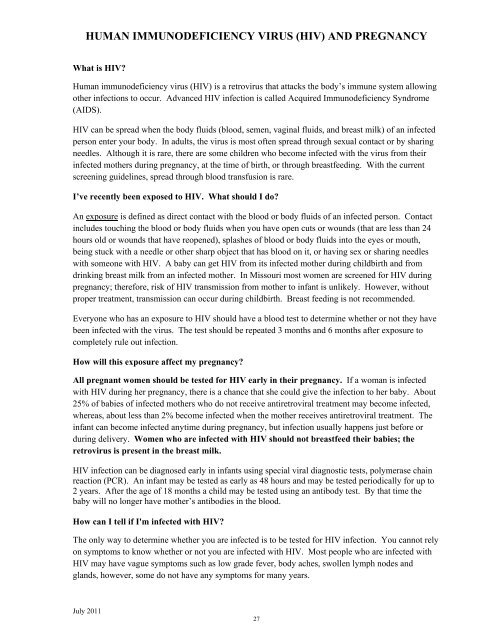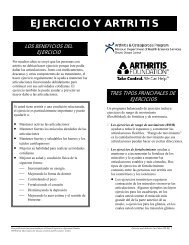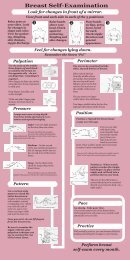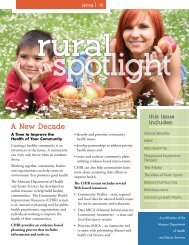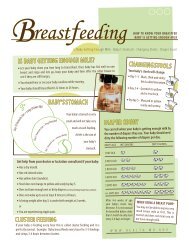Prevention and Control of Communicable Diseases - Missouri ...
Prevention and Control of Communicable Diseases - Missouri ...
Prevention and Control of Communicable Diseases - Missouri ...
Create successful ePaper yourself
Turn your PDF publications into a flip-book with our unique Google optimized e-Paper software.
HUMAN IMMUNODEFICIENCY VIRUS (HIV) AND PREGNANCY<br />
What is HIV?<br />
Human immunodeficiency virus (HIV) is a retrovirus that attacks the body’s immune system allowing<br />
other infections to occur. Advanced HIV infection is called Acquired Immunodeficiency Syndrome<br />
(AIDS).<br />
HIV can be spread when the body fluids (blood, semen, vaginal fluids, <strong>and</strong> breast milk) <strong>of</strong> an infected<br />
person enter your body. In adults, the virus is most <strong>of</strong>ten spread through sexual contact or by sharing<br />
needles. Although it is rare, there are some children who become infected with the virus from their<br />
infected mothers during pregnancy, at the time <strong>of</strong> birth, or through breastfeeding. With the current<br />
screening guidelines, spread through blood transfusion is rare.<br />
I’ve recently been exposed to HIV. What should I do?<br />
An exposure is defined as direct contact with the blood or body fluids <strong>of</strong> an infected person. Contact<br />
includes touching the blood or body fluids when you have open cuts or wounds (that are less than 24<br />
hours old or wounds that have reopened), splashes <strong>of</strong> blood or body fluids into the eyes or mouth,<br />
being stuck with a needle or other sharp object that has blood on it, or having sex or sharing needles<br />
with someone with HIV. A baby can get HIV from its infected mother during childbirth <strong>and</strong> from<br />
drinking breast milk from an infected mother. In <strong>Missouri</strong> most women are screened for HIV during<br />
pregnancy; therefore, risk <strong>of</strong> HIV transmission from mother to infant is unlikely. However, without<br />
proper treatment, transmission can occur during childbirth. Breast feeding is not recommended.<br />
Everyone who has an exposure to HIV should have a blood test to determine whether or not they have<br />
been infected with the virus. The test should be repeated 3 months <strong>and</strong> 6 months after exposure to<br />
completely rule out infection.<br />
How will this exposure affect my pregnancy?<br />
All pregnant women should be tested for HIV early in their pregnancy. If a woman is infected<br />
with HIV during her pregnancy, there is a chance that she could give the infection to her baby. About<br />
25% <strong>of</strong> babies <strong>of</strong> infected mothers who do not receive antiretroviral treatment may become infected,<br />
whereas, about less than 2% become infected when the mother receives antiretroviral treatment. The<br />
infant can become infected anytime during pregnancy, but infection usually happens just before or<br />
during delivery. Women who are infected with HIV should not breastfeed their babies; the<br />
retrovirus is present in the breast milk.<br />
HIV infection can be diagnosed early in infants using special viral diagnostic tests, polymerase chain<br />
reaction (PCR). An infant may be tested as early as 48 hours <strong>and</strong> may be tested periodically for up to<br />
2 years. After the age <strong>of</strong> 18 months a child may be tested using an antibody test. By that time the<br />
baby will no longer have mother’s antibodies in the blood.<br />
How can I tell if I'm infected with HIV?<br />
The only way to determine whether you are infected is to be tested for HIV infection. You cannot rely<br />
on symptoms to know whether or not you are infected with HIV. Most people who are infected with<br />
HIV may have vague symptoms such as low grade fever, body aches, swollen lymph nodes <strong>and</strong><br />
gl<strong>and</strong>s, however, some do not have any symptoms for many years.<br />
July 2011<br />
27


